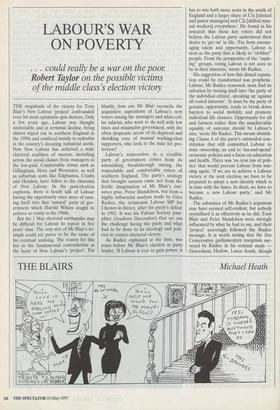LABOUR'S WAR ON POVERTY
. . . could really be a war on the poor Robert Taylor on the possible victims of the middle class's election victory THE magnitude of the victory for Tony Blair's New Labour 'project' confounded even his most optimistic spin doctors. Only a few years ago, Labour was thought unelectable and in terminal decline, being almost wiped out in southern England in the 1980s and confined mainly to redoubts in the country's decaying industrial north. Now New Labour has achieved a wide electoral coalition of success, stretching across the social classes from managers to the low-paid. Comfortable towns such as Gillingham, Hove and Worcester, as well as suburban seats like Edgbaston, Crosby and Hendon, have fallen to the charisma of New Labour. In the post-election euphoria, there is heady talk of Labour having the opportunity once more of turn- ing itself into that 'natural' party of gov- ernment which Harold Wilson sought to achieve so vainly in the 1960s.
But the 1 May electoral earthquake may be difficult for Labour to repeat in five years' time. The very size of Mr Blair's tri- umph could yet prove to be the cause of his eventual undoing. The reason for this lies in the fundamental contradiction at the heart of New Labour's 'project'. Put bluntly, how can Mr Blair reconcile the acquisitive aspirations of Labour's new voters among the managers and white-col- lar salariat, who want to do well with low taxes and minimalist government, with the often desperate needs of its deprived and shrinking core of manual working-class supporters, who look to the state for pro- tection?
Labour's reinvention as a credible party of government comes from its astonishing breakthrough among the respectable and comfortable voters of southern England. The party's strategy that brought success came not from the fertile imagination of Mr Blair's emi- nence grise, Peter Mandelson, but from a highly influential analysis made by Giles Radice, the revisionist Labour MP for Chester-le-Street, after his party's defeat in 1992. It was his Fabian Society pam- phlet (Southern Discomfort) that set out the challenge facing the party and what had to be done to its ideology and poli- cies to ensure electoral victory.
As Radice explained at the time, two years before Mr Blair's election as party leader, 'If Labour is ever to gain power, it has to win both more seats in the south of England and a larger share of Cis [clerical and junior managers] and C2s [skilled man- ual workers] everywhere.' He found in his research that those key voters did not believe the Labour party understood their desire to 'get on' in life. 'Far from encour- aging talent and opportunity, Labour is seen as the party that is likely to "clobber" people. From the perspective of the "aspir- ing" groups, voting Labour is not seen to be in their interests,' wrote Mr Radice.
His suggestion of how this dismal reputa- tion could be transformed was prophetic. Labour, Mr Radice reasoned, must find its salvation by turning itself into 'the party of the individual citizen', speaking up 'against all vested interests'. 'It must be the party of genuine opportunity, ready to break down barriers to social mobility and promote individual life chances. Opportunity for all and fairness rather than the unachievable equality of outcome should be Labour's aim,' wrote Mr Radice. This meant abolish- ing Clause 4 of the party's outmoded con- stitution that still committed Labour to state ownership, an end to `tax-and-spend' economic policies and a focus on education and health. There was 'no iron law of poli- tics' that would prevent Labour from win- ning again. 'If we are to achieve a Labour victory at the next election, we have to be prepared to adopt a new identity which is in tune with the times. In short, we have to become a new Labour party,' said Mr Radice.
The substance of Mr Radice's argument may have seemed self-evident, but nobody crystallised it as effectively as he did. Tony Blair and Peter Mandelson were strongly influenced by what he had to say, and their 'project' unerringly followed the Radice message. It is worth noting that the five Conservative parliamentary marginals sur- veyed by Radice in his seminal study — Gravesham, Harlow, Luton South, Slough and Stevenage — all fell to Labour in last week's general election.
But just how new is New Labour? The Blair 'project' gives the misleading impres- sion that it marks a radical break with the past. But in boasting of the wonders of Labour's transformation, a caricature has been created of what the party was really like before Blair's arrival. Here was a dog- matic, ideological party, it is claimed, dom- inated by obstructive trade unions and the hard Left, fiscally irresponsible and obsessed with state control. This portrait of the party may have looked familiar in much of the 1970s and early 1980s, but it was always an aberration from a respectable and modest Labour norm.
The pragmatic and inclusive Labour party of Harold Wilson and Clement Attlee was just as socially broad-based and more electorally popular than that of Mr Blair. If it had not been able to cut a swathe through the suburban seats of southern England, Labour would never have been able to win four general elec- tions between 1945 and 1966. Moreover, the party secured a larger share of the popular vote in those contests (47 to 48 per cent) than Mr Blair achieved last week (44 per cent). The secret of Labour's suc- cess in the postwar years came from its ability, in the words of the arch-mod- erniser Tony Crosland, to present itself as 'a broadly based, national, people's party'. Winning the votes of what were the 'black- coated' workers and their families in sub- urbia was crucial to the party's electoral credibility. As MP for East Lewisham, Mandelson's grandfather, Herbert Morri- son, knew this full well.
The threat to the party's survival emerged only after 1970, when a widening gulf began to separate Labour from the aspirations of the wider electorate. On issue after issue the party found that it no longer mirrored the aspirations of ordinary people. Changes in working-class ways of life, and rising affluence, were not reflect- ed in the party's own behaviour. Labour became dominated by an unattractive alliance: a selfish public sector trade unionism and the pseudo-Marxism of the polytechnocracy.
The achievement of the Blair 'project' has been to reconnect Labour with the aspiring groups it lost nearly 20 years ago. It has done so by adapting its values to the new realities, appealing to the enlightened self-interest of skilled workers, managers and professionals, especially those who are young. If this had not happened, Labour would never have won so convincingly last Thursday. As Radice again explained: 'Labour cannot win relying on its "core" voters amongst the unskilled manual work- ers because there are not enough of them.' But in meeting the needs of the focus groups of southern England the party has created a dilemma for itself. Before 1970 those swing voters could be won over by staple Labour appeals. Reading Wilson's 1964 campaign speeches today, one is struck by just how much he favoured plan- ning, an activist central state and high public expenditure. None of this appeared to offend the affluent and the meritocrat- ic. Through economic growth, the poor and the old could be helped without alien- ating the successful. But this appeal is no longer possible. Mr Blair's 'project' has meant an end to redistribution of income and wealth, curbs on the public sector and a restrictive monetary policy in order to convince today's southern voters that it is safe to vote Labour again.
But this means that Labour has little positive to offer its core voters. Labour candidates in the inner-city and industrial heartlands were told on many doorsteps by the old, the unemployed, the unmar- ried mothers: why should we bother to vote for you? The low turnouts in many Labour safe seats last Thursday suggest many of them are no longer ready to vote for what was once seen as the party of the underdog. What New Labour mainly seems to be offering them is nothing but social control and coercion in what sounds like a virtual declaration of war on the underclass. Law and order will be enforced more effectively against social deviance on troubled housing estates. The promised welfare-to-work regime will force alienated youth into jobs under threat of losing benefit. The impoverished old are being promised a Royal Commis- sion to look at their pension provision. Middle England believes the social securi- ty budget is too high because of the work- shy and scroungers who abuse its alleged extravagance. Frank Field's appointment to the social security department to 'think the unthinkable' is a sign that compulsion is to be at the centre of Labour's welfare strategy.
All of this may please the voters of Mid- dle England, but Mr Blair will have to per- form a remarkable balancing act if he hopes to keep his new electoral coalition from falling apart. It is possible he will be able to transform Labour into 'the people's party', but, as always, it is the 'contingent and unforeseen' which will determine his success. The fragile New Labour 'project' will never be easy to hold together when hard economic choices about taxes and spending have to be made. Middle England may turn out to be a fickle source of politi- cal power for Mr Blair, while his core vot- ers could easily ebb away if he offers them little more than coercion. In short, it is the volatility of British politics which will pro- vide the final answer to New Labour's life expectancy.
Robert Taylor is employment editor of the Financial Times.



































































 Previous page
Previous page